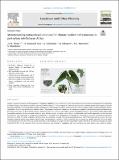Mainstreaming nature-based solutions for climate resilient infrastructure in peri-urban sub-Saharan Africa
Abstract
Despite a growing recognition of the importance of designing, rehabilitating, and maintaining green infrastructure to provide essential ecosystem services and adapt to climate change, many decision makers in sub-Saharan Africa continue to favour engineered solutions and short term economic growth at the expense of natural landscapes and longer term sustainability agendas. Existing green infrastructure is typically maintained in more affluent suburbs, inadvertently perpetuating historic inequalities. This is in part because there remains a lack of fine-grained, comparative evidence on the barriers and enablers to mainstreaming green infrastructure in peri-urban areas. Here, we developed an analytical framework based on a review of 155 studies, screened to include 29 studies in 24 countries. Results suggest eight overarching categories of interconnected barriers to green infrastructure in peri-urban areas. Using a combinatorial mixed method approach, we then surveyed households in nine settlements in drought-prone Windhoek (n=330) and seven settlements in flood-prone Dar es Salaam (n=502) and conducted key informant interviews (n=118). Peri-urban residents in Windhoek and Dar es Salaam indicated 18 forms of green infrastructure and 47 derived ecosystem services. The most frequently reported barriers were financial (40.8%), legal and institutional barriers (35.8%) followed by land use change and spatial trade-offs (33%) and finally ecosystem disservices (30.6%). The most significant barriers in Dar es Salaam were legal and institutional (22.7%) and in Windhoek were land use change and spatial trade-offs (24.4%). At the household level, the principal barrier was financial; at community and municipal levels the main barriers were related to design, performance, and maintenance; while at the national level, the main barriers were legal and institutional. Embracing institutional cultures of adaptive policymaking, equitable partnerships, co-designing futures, integrated landscape management and experimental innovation have potential to scale long term maintenance for urban green infrastructure and foster agency, creativity and more transformative relationships and outcomes.
Citation
Thorn , J , Biancardi-Aleu , R , Wijesinghe , A , Mdongwe , M , Marchant , R & Shackleton , S 2021 , ' Mainstreaming nature-based solutions for climate resilient infrastructure in peri-urban sub-Saharan Africa ' , Landscape and Urban Planning , vol. 216 , no. 15 , 104235 . https://doi.org/10.1016/j.landurbplan.2021.104235
Publication
Landscape and Urban Planning
Status
Peer reviewed
ISSN
0169-2046Type
Journal article
Description
This work was conducted under the “Urban Ecolution: Predicting synergies and trade-offs of water-related ecological infrastructure for climate adaptation in peri-urban Sub-Saharan Africa'', supported through the Climate Research for Development Postdoctoral Fellowship (CR4D-19-21) implemented by the African Academy of Sciences in partnership with the UK’s Department for International Development, Weather and Climate Information Services for Africa (WISER) programme and the African Climate Policy Center of the United Nations Economic Commission for Africa. This study has also been funded in part by the African Women in Climate Change Science Fellowship supported by the African Institute of Mathematical Sciences Next Einstein Forum and the International Development Research Centre of Canada Aid, the UK’s Research and Innovation’s Global Challenges Research Fund under the Development Corridors Partnership project (ES/P011500/1), and Lincre College, University of Oxford.Collections
Items in the St Andrews Research Repository are protected by copyright, with all rights reserved, unless otherwise indicated.

